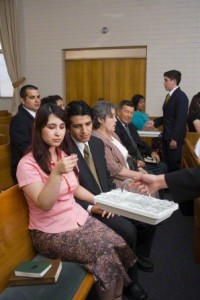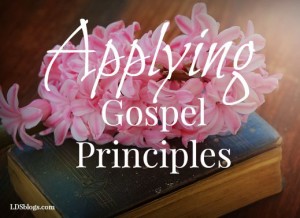What is the sacrament? We partake of it every week, but why?
In my quest to further my sacramental understanding, I decided to study the sacrament’s components. And I started by looking at the word itself.
Sacred
What definitions of “sacred” stand out to you as you worship the Lord through the sacrament?
SA’CRED, adjective [Latin sacer, sacred holy, cursed, damnable. We here see the connection between sacredness and secrecy. The sense is removed or separated from that which is common, vulgar, polluted, or open, public; and accursed is separated from society or the privileges of citizens, rejected, banished.]
1. Holy; pertaining to God or to his worship; separated from common secular uses and consecrated to God and his service; as a sacred place; a sacred day; a sacred feast; sacred service; sacred orders.
2. Proceeding from God and containing religious precepts; as the sacred books of the Old and New Testament.
3. Narrating or writing facts respecting God and holy things; as a sacred historian.
4. Relating to religion or the worship of God; used for religious purposes; as sacred songs; sacred music; sacred history.
5. Consecrated; dedicated; devoted; with to.
6. Entitled to reverence; venerable.
7. Inviolable, as if appropriated to a superior being; as sacred honor or promise.
 What is “consecrated to God and his service?” Are the sacramental emblems consecrated? Is the Savior who we worship during the sacrament consecrated? Are those who bless and pass the sacrament consecrated? Is my participation in the sacrament consecrated to God and His purpose? Am I/should I become consecrated?
What is “consecrated to God and his service?” Are the sacramental emblems consecrated? Is the Savior who we worship during the sacrament consecrated? Are those who bless and pass the sacrament consecrated? Is my participation in the sacrament consecrated to God and His purpose? Am I/should I become consecrated?
What is consecration, anyway? What are its implications? How does the sacrament consecrate?
As I read “proceeding from God,” my mind flew to Doctrine and Covenants 88:11-13.
“And the light which shineth, which giveth you light, is through him who enlighteneth your eyes, which is the same light that quickeneth your understandings; Which light proceedeth forth from the presence of God to fill the immensity of space—The light which is in all things, which giveth life to all things, which is the law by which all things are governed, even the power of God who sitteth upon his throne, who is in the bosom of eternity, who is in the midst of all things.”
Just as light/truth fills the immensity of space, the sacramental emblems proceed from God to fill my microcosmic universe.
Hallow
“Sacrament” derives also from “sacrare,” meaning to hallow.
HAL’LOW, verb transitive [Latin calleo, to be able.]
1. To make holy; to consecrate; to set apart for holy or religious use.
2. To devote to holy or religious exercises; to treat as sacred.
3. To reverence; to honor as sacred.
“But know that the Lord hath set apart him that is godly for himself … Offer the sacrifices of righteousness, and put your trust in the Lord.” – Psalms 4: 3, 5
Solemn
SOLEMN, adjective sol’em. [Latin solennis, form soleo, to be accustomed, to use, that is, to hold on or continue, as we have wont.]
1. Anniversary; observed once a year with religious ceremonies. The worship of this image was advanced and a solemn supplication observed every year.
2. Religiously grave; marked with pomp and sanctity; attended with religious rites. His holy rites and solemn feasts profan’d.
3. Religiosly serious; piously grave; devout; marked by reverence to God; as solemn prayer; the solemn duties of the sanctuary.
4. Affectiong with seriousness; impressing or adapted to impress seriousness, gravity or reverence; sober; serious. There reign’d a solemnsilence over all. To ‘swage with solemn touches troubled thoughts.
5. Grave; serious; or affectedly grave; as a solemn face.
6. Sacred; enjoined by religion; or attended with a serious appeal to God; as a solemn oath.
7. Marked with solemaities; as a solemn day.
“And that thou mayest more fully keep thyself unspotted from the world, thou shalt go to the house of prayer and offer up thy sacraments upon my holy day…. And inasmuch as ye do these things with thanksgiving, with cheerful hearts and countenances, not with much laughter, for this is sin, but with a glad heart and a cheerful countenance—
Verily I say, that inasmuch as ye do this, the fulness of the earth is yours, the beasts of the field and the fowls of the air, and that which climbeth upon the trees and walketh upon the earth;Yea, and the herb, and the good things which come of the earth, whether for food or for raiment, or for houses, or for barns, or for orchards, or for gardens, or for vineyards;Yea, all things which come of the earth, in the season thereof, are made for the benefit and the use of man, both to please the eye and to gladden the heart;Yea, for food and for raiment, for taste and for smell, to strengthen the body and to enliven the soul.”
Oath
OATH, noun
A solemn affirmation or declaration, made with an appeal to God for the truth of what is affirmed. The appeal to God in an oath implies that the person imprecates his vengeance and renounces his favor if the declaration is false, or if the declaration is a promise, the person invokes the vengeance of God if he should fail to fulfill it. A false oath is called perjury.
When I think of the binding nature of oaths, Zoram and Nephi’s story stands out. Zoram followed Nephi thinking Nephi was his boss, Laban. When Zoram discovered Nephi was not Laban and realized what that meant, he feared for his life. Nephi and his brothers also feared for theirs. However, when Nephi swore an oath to Zoram and then Zoram reciprocated, both sides felt secure.
“When Zoram had made an oath unto us, our fears did cease concerning him.” – 1 Nephi 4:37
Can the Lord trust me as much because He’s that confident in the oath I make each week? Am I?
 My oath when I partake of the bread is “and witness unto thee, O God, the Eternal Father, that they are willing to take upon them the name of thy Son, and always remember him, and keep his commandments which he hath given them, that they may always have his Spirit to be with them.” (Moroni 4:3)
My oath when I partake of the bread is “and witness unto thee, O God, the Eternal Father, that they are willing to take upon them the name of thy Son, and always remember him, and keep his commandments which he hath given them, that they may always have his Spirit to be with them.” (Moroni 4:3)
My oath when I partake of the water is “that they may witness unto thee, O God, the Eternal Father, that they do always remember him, that they may have his Spirit to be with them.” (Moroni 5:2)
“Willing, always remember and keep” are definitive words I don’t always live up to. But with through the Lord’s strength I can do all things.
“Yea, I know that I am nothing; as to my strength I am weak; therefore I will not boast of myself, but I will boast of my God, for in his strength I can do all things….” (Alma 26:12)
Mystery
MYS’TERY, noun [Latin mysterium; Gr. a secret. This word in Greek is rendered also murium latibulum; but probably both senses are from that of hiding or shutting; Gr. to shut, to conceal.
1. A profound secret; something wholly unknown or something kept cautiously concealed, and therefore exciting curiosity or wonder.
2. In religion, any thing in the character or attributes of God, or in the economy of divine providence, which is not revealed to man.
3. That which is beyond human comprehension until explained. In this sense, mystery often conveys the idea of something awfully sublime or important; something that excites wonder.
I love that sacrament derives from “mystery!” That implies that so much lies beneath the surface! The Lord promises that we can know His mysteries! The sacrificing Atonement of Jesus Christ certainly is beyond comprehension until explained. And even then, I need more explanation. But He invites us/me to come to Him, to learn of Him, and He delights to teach us.
“Yea, he that repenteth and exerciseth faith, and bringeth forth good works, and prayeth continually without ceasing—unto such it is given to know the mysteries of God; yea, unto such it shall be given to reveal things which never have been revealed….” (Alma 26:22)
“For he that diligently seeketh shall find; and the mysteries of God shall be unfolded unto them, by the power of the Holy Ghost, as well in these times as in times of old, and as well in times of old as in times to come; wherefore, the course of the Lord is one eternal round.” (1 Nephi 10:19)
“All things are delivered unto me of my Father: and no man knoweth the Son, but the Father; neither knoweth any man the Father, save the Son, and he to whomsoever the Son will reveal him. Come unto me….” (Matthew 11:27)
What glorious prospects!
Sacrament
So what is the actual word’s definition?
SAC’RAMENT, noun [Latin sacramentum, an oath, from sacer, sacred.]
1. Among ancient christian writers, a mystery. [Not in use.]
2. An oath; a ceremony producing an obligation; but not used in this general sense.
3. In present usage, an outward and visible sign of inward and spiritual grace; or more particularly, a solemn religious ceremony enjoined by Christ, the head of the christian church, to be observed by his followers, by which their special relation to him is created, or their obligations to him renewed and ratified. Thus baptism is called a sacrament for by it persons are separated from the world, brought into Christ’s visible church, and laid under particular obligations to obey his precepts. The eucharist or communion of the Lord’s supper, is also a sacrament for by commemorating the death and dying love of Christ, christians avow their special relation to him, and renew their obligations to be faithful to their divine Master. When we use sacrament without any qualifying word, we mean by it,
4. The eucharist or Lord’s supper.
And the definition of Eucharist?
EU’CHARIST, noun [Gr. a giving of thanks; well, favor.]
1. The sacrament of the Lord’s supper; the solemn act or ceremony of commemorating the death of our Redeemer, in the use of bread and wine, as emblems of his flesh and blood, accompanied with appropriate prayers and hymns.
2. The act of giving thanks.

To read more of Delisa’s articles, click here.
A phrase that struck me was “an outward and visible sign of inward and spiritual grace.” What a penultimate definition! This stands in stark contrast to Pharisees who Jesus said “indeed appear beautiful outward, but are within full of dead men’s bones, and of all uncleanness. Even so ye also outwardly appear righteous unto men, but within ye are full of hypocrisy and iniquity.” (Matthew 23:27-28)
For Latter-day Saints, the weekly sacrament honors the Savior’s Atoning sacrifice and our personal baptismal covenants. Because Jesus Christ atoned for sin, death, and the Fall, we can make sacred oaths covenanting to seek the meanings of holy, sacred mysteries by keeping Christ’s commandments and always remembering Him.
I am a member of The Church of Jesus Christ of Latter-day Saints. I have moved 64 times and have not tired of experiencing this beautiful earth! I love the people, languages, histories/anthropologies, & especially religious cultures of the world. My life long passion is the study & searching out of religious symbolism, specifically related to ancient & modern temples. My husband Anthony and I love our bulldog Stig, adventures, traveling, movies, motorcycling, and time with friends and family.






